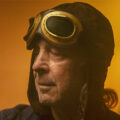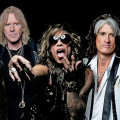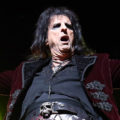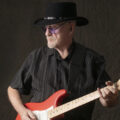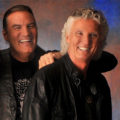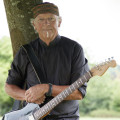Uli Jon Roth unloading “Interstellar Sky Guitar” and all the early Scorpions on Arcada, Reggies
 Photos provided by Chipster PR
Photos provided by Chipster PR
Before the Scorpions became the radio and video juggernaut who could “Rock You Like A Hurricane,” they were blazing an adventurous trail that put German hard rock and heavy metal on the international map.
A pivotal part of the equation was guitar hero Uli Jon Roth, who was a constant contributor to such cult classic albums as “Fly To The Rainbow,” “In Trance,” “Virgin Killer” and “Taken By Force” throughout the 1970s, prior to voluntarily stepping down to pursue an even more experimental career in Electric Sun and numerous solo projects.
In a far-ranging call with Chicago Concert Reviews, the 69-year-old legend spoke of how each of those eras will converge on the “Interstellar Sky Guitar” Tour, which comes to the the Arcada Theatre on Friday, April 19 and Reggies Chicago on Saturday, April 20, alongside what it was like helping get the eventually enormous group going and the many mighty axe-slingers who followed in his footsteps.
What comes to mind as you make your way back to the Chicago area?
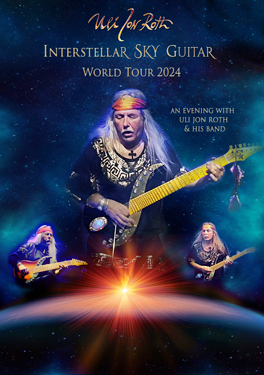 Uli Jon Roth: The first time was in ‘85 in the Metro and I remember that was a special concert. The people were so nice. Chicago, obviously, is always great. I don’t think I’ve ever had a bad concert there and I’ve been there many times, knock on wood. We did the House Of Blues and now we’re like in permanent residence at Reggies. That’s where we’ve played the last few times and that’s what we’re doing this time as well. We’re going to Reggies, but also the Arcada Theatre, which is a little further away in St. Charles…Reggies is more of a club experience. You’re closer and it’s a completely different vibe. The Arcada is a big theatre/stage experience and that’s completely different.
Uli Jon Roth: The first time was in ‘85 in the Metro and I remember that was a special concert. The people were so nice. Chicago, obviously, is always great. I don’t think I’ve ever had a bad concert there and I’ve been there many times, knock on wood. We did the House Of Blues and now we’re like in permanent residence at Reggies. That’s where we’ve played the last few times and that’s what we’re doing this time as well. We’re going to Reggies, but also the Arcada Theatre, which is a little further away in St. Charles…Reggies is more of a club experience. You’re closer and it’s a completely different vibe. The Arcada is a big theatre/stage experience and that’s completely different.
Is the set list the same or do you mix it up?
Roth: Well, largely yes, but there are certain things which I’m moving around, like yesterday I did some things quite differently. We like to keep it fresh, so some songs will make an appearance one night, and then they’re not there for a few nights and others come. Yeah, we do that and it’s usually very spontaneous. I might decide that on the stage.
Can you tell us a bit about the name behind the “Interstellar Sky Guitar” Tour?
Roth: Yeah, it’s a little tongue in cheek. A lot of my subject matter is a little bit extraterrestrial I guess. You know, on the spiritual side. It’s about things that you cannot touch that still matter, like what’s inside of us. I had an album called “Transcendental Sky Guitar” at one point. It was a double album and it was all about pushing the guitar to new limits in terms of expression and also on a technical level. This tour is a little bit like that.
The first set has some virtuoso pieces, but also pieces which are also just very musical, slow guitar, which I love. It’s called “An Evening With Uli Jon Roth,” so I’m talking quite a bit, telling stories. I’m talking about my new book, “In Search Of The Alpha Law.” We have a big screen and that supports me, and the music, some of it is classical. I’m doing some of Vivaldi’s “The Four Seasons” and Mozart with the orchestra on the screen while I’m playing in front. That is quite a trip, like an IMAX experience kind of. I’m also playing some flamenco guitar and some new pieces, which I haven’t played in the States before.
 Then there’s an intermission and the second half of the show is completely different. It’s with my full band and we’re playing the “Tokyo Tapes Revisited” set largely, which means there’s a lot of early Scorpions, some Electric Sun and also a little bit of [Jimi] Hendrix. That’s pretty much it in a nutshell.
Then there’s an intermission and the second half of the show is completely different. It’s with my full band and we’re playing the “Tokyo Tapes Revisited” set largely, which means there’s a lot of early Scorpions, some Electric Sun and also a little bit of [Jimi] Hendrix. That’s pretty much it in a nutshell.
You of course mentioned Scorpions and Electric Sun. What goals did you have when you transitioned from one band to the next?
Roth: The goal was that I wanted to be free to express myself and all the musical ideas that came to me. In the Scorpions, I was very happy, but when you’re in a band like that, there’s a certain commercial framework, which didn’t allow you to bring ten-minute symphonic guitar extravaganzas without vocals (laughs). That would’ve been a deal breaker, but that’s exactly the kind of music that I wanted to write at that time and that’s why I had to leave. It was an artistic decision and nothing but an artistic decision. There were no personal problems with the band. On the contrary, we were a great unit and it was always really enjoyable to be with these guys.
You were part of four classic studio albums and a live one as well. How would you describe the group’s growth throughout each of those projects?
Roth: It was stellar. I mean, every year we kind of made a quantum leap. Really every album is different of those four and “Tokyo Tapes” is different, that’s the fifth. “Tokyo Tapes” represents the image that we were live, so that was slightly different from the albums. Live, we took more chances. We improvised. We played even different songs that were not on the albums. And the studio albums, each of them was, I think, a step forward into a new direction. We were just doing what naturally came to us.
How did you feel about the controversy caused by some of the original artwork?
Roth: Well, completely justified, but back then, I wasn’t mature enough to understand the complete gravity of the situation. The [naked girl] album cover for “Virgin Killer” was a big mistake, but that said, I didn’t see it. I saw it in a light-hearted manner, but I shouldn’t have done that. And while it wasn’t our idea to do that, it was the record company, in the end, of course, we were still responsible because we could’ve vetoed it and we didn’t. It’s that simple. I regret this album cover each time that somebody comes and I have to sign it in front of my daughter. I cringe.
What are you the most proud of from that period?
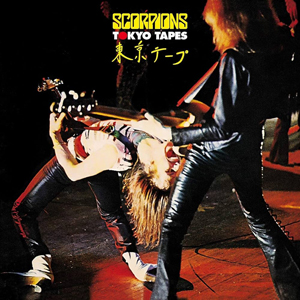 Roth: I guess just the general part of being there. I contributed my two cents worth to the journey of the Scorpions because their success didn’t come out of nowhere. It was well deserved and it was a step by step gradual thing. I was just proud of even being there. There several albums I preferred to [other] albums, but that doesn’t matter. They were all part of the journey, so that’s why I like them all.
Roth: I guess just the general part of being there. I contributed my two cents worth to the journey of the Scorpions because their success didn’t come out of nowhere. It was well deserved and it was a step by step gradual thing. I was just proud of even being there. There several albums I preferred to [other] albums, but that doesn’t matter. They were all part of the journey, so that’s why I like them all.
Where would you point a younger listener to start in the Scorpions’ catalogue?
Roth: I’ve got no idea. Maybe “Tokyo Tapes”? I don’t know because every album is so different, you know? There isn’t one defining one. It depends on what you prefer. If you prefer the exciting, harder aspect, the wild aspect of the Scorpions, then “Virgin Killer” is the one to go to. If you want slightly more lyrical, you go to “In Trance” or maybe some of “Taken By Force.” If you want it a little bit more psychedelic, you go to “Fly To The Rainbow.” That’s more experimental, so it depends on what you prefer.
Speaking of the “Tokyo Tapes,” what was it like for you going back to the same location to re-record it with your band?
Roth: It was really nice, but that was intentional. I wanted to look at that material after 40-something years and see what would happen and something really nice happened. It became one of my best albums, I think, the live “Tokyo Tapes Revisited.” The video turned out really nice. It’s not an easy assignment to reinterpret and revisit the sins of your youth, and make it work 40 years later, because we’re different musicians, and of course, I’m different too. But I found it quite invigorating, and inspirational, and I just kind of [discovered] new aspects in the songs that I didn’t even know were there, so it was worthwhile.
After you left, what was your opinion of the band going in a more commercial direction?
Roth: You know, at that point I disconnected from it all. I really wasn’t that interested. I didn’t even follow their career because I was wrapped up in my own thing, which was completely different and was non-commercial, and decidedly so, so I wasn’t even aware how successful they became in the States, and that took a little while also. They just started writing stronger songs and then suddenly they became hit songs, deservedly so, because they were great. Scorpions were always one of the few bands that were really good writing melody. It’s just that more bands are more riff-based or they have other strengths, but the Scorpions, they were melodic, super melodic I would say in terms of what’s out there in rock. I think that was, apart from several other factors of course, that was the thing that did it. That gave the band what they had and still have.
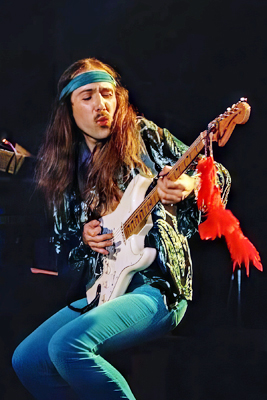 What is your relationship with the group like nowadays and do you ever see yourself collaborating again?
What is your relationship with the group like nowadays and do you ever see yourself collaborating again?
Roth: It’s unlikely. They do their thing. I do my thing. I think they don’t want to rock the boat with new stuff. That’s my personal feeling. I don’t look towards that direction. I wouldn’t rule it out. Anything could always happen out of nowhere. These things can occur, but I would say at this late stage, it’s rather unlikely. They’ve got their thing and it’s rolling. The machinery is rolling. It’s a very conformable set up. The feeling I get is the last thing they want is do is something experimental, and with me, it’s always experimental. You don’t know what you get. I don’t know what you get (laughs).
Who are some of the other partnerships that stood out for you?
Roth: I haven’t had many partnerships in terms of recording. These were more like live occasions. I sat in with some of the great bands. I’ve played with Deep Purple several times, quite a few others too. UFO, there were so many. Talking Chicago, of course The Smashing Pumpkins. I loved playing with Billy Corgan and the band. He always has great musicians. I love the drummer [Jimmy Chamberlin]. He plays phenomenal and Billy is one of the few people who goes up there without a script, just jamming and I like that he’s able to do that. Not many people can do that. He’s musical enough to go where other people are afraid to go, so I really like that, apart from the fact that he’s such an interesting person.
He was certainly very influenced by your guitar playing. Can you think of a few other notable guitarists who really credited you?
Roth: Well yeah, there was [Eddie] Van Halen. There was Yngwie Malmsteen, Steve Vai, Joe Satriani, Kirk Hammett [from Metallica]. I mean the list is literally endless and it just happens. I was influenced by the ones before me and I was before them. I was, say, second generation of the electric guitar really. You know with Hendrix, and [Eric] Clapton, and the blues players being the first generation, so to speak. You could also say that the first generation were other people like Charlie Christian and Wes Montgomery, I don’t know. I’m talking about the blues-based pentatonic world that made it to the big stage, which is what Eric Clapton incorporated. There’s many who said they were influenced and sometimes you can hear it in their playing. It’s quite natural. I mean, I know that Van Halen when they were not famous yet, they used to cover certain Scorpions songs. They played “Speedy’s Coming.” They played “Catch Your Train.” Yngwie covered quite a few of mine, “The Sails Of Charon,” “Earthquake,” “We’ll Burn The Sky,” all these things and it shows in his playing. These things are a natural progression I would say.
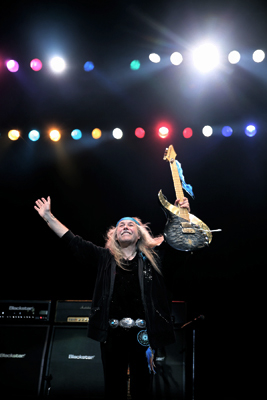 In what ways do you feel like you might have been pioneering in terms of guitar sounds and even the instrument itself?
In what ways do you feel like you might have been pioneering in terms of guitar sounds and even the instrument itself?
Roth: All of your questions are geared in a sort of way where I constantly have to toot my horn. Thanks a lot (laughs). So I have to be careful how to frame these things…It’s true. I’ve always been a pioneer and I’m still a pioneer. That’s my game. My natural inclination is to go to places that no one has gone before. I feel attracted to that. Maybe it’s my curiosity or I’m looking for something new, something that thrills me that I haven’t heard yet. Maybe it’s all these things together and that’s that. And then others [latch] onto that and they may follow. That’s how things happen. One lemming jumps the cliff and then they all jump the cliff (laughs).
That’s what happened when Van Halen did his tapping. It became an epidemic. Nobody did it as good as he did, but they all did it, even faster and more extravagant and it became an epidemic. When Eric Clapton and Jimi Hendrix first had the wah-wah [pedal], it became a wah-wah [trend]. When I did the dive bombs, which were kind of completely derived from Jimi Hendrix or people like Ritchie Blackmore [Deep Purple, Rainbow], then people started to copy me and you had dive bombs on the guitar everywhere until you were sick of them. When Yngwie started to do his quick arpeggios, a whole brigade of young guitar players started doing the same and it became an epidemic (laughs). And then after some time, the field levels out and the latest new fad arrives. They’re all doing that for awhile until the caravan moves on. It’s always like that.
Where are you at now? What’s in your head and hands?
Roth: The thing is I don’t play much these days. I play a very little, but each time I pick up the instrument, I have new ideas and that never changes. I’m always treating it like a first day experience. It’s always special. It’s like going to church. I pick up the guitar and I have the deepest respect, love and reverence for the music and the instrument. That’s half the story, but if you have that kind of attitude, that helps a lot. A lot of people are extremely casual with it and they don’t respect the instrument or the music and I don’t like that. I resent that when I see that.
Besides anything new you might debut at these shows, you’re in the process of re-releasing Electric Sun on vinyl, correct?
Roth: Yes, absolutely, that’s a new thing that we’re doing. I founded my own, very personal record label called Alpha Experium and the idea is to re-release all my catalogue in the best possible way, completely freshly remastered with new artwork to the highest standard possible. “Earthquake” is the first of these, but I’ve already finished “Fire Wind” as well. That will be next and they’ll be “Beyond The Astral Skies.” They’ll be [the solo] “Transcendental Sky Guitar,” “Sky Of Avalon.” We are going to re-release all of them, also on vinyl, because for the collectors, these [Electric Sun albums] haven’t been available for 40 years or something like that.
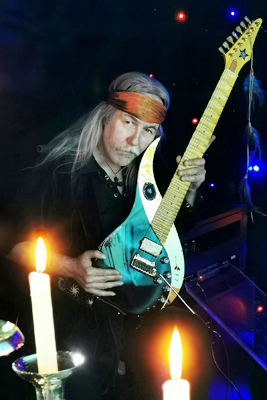 Outside of strictly music, what do you want people to know about your upcoming book “In Search Of The Alpha Law”?
Outside of strictly music, what do you want people to know about your upcoming book “In Search Of The Alpha Law”?
Roth: The book is not autobiographical. It is a book which has a philosophical leaning because every since I was very young, I was fascinated by fundamental questions of how things work, what we are, who we are, why we’re here. I came across the idea that there’s one fundamental, universal law of the universe, which governs all other laws. There’s one number one thing, just like a black hole in the center of a spiral galaxy is the center of energy. This law, I call it the “alpha law,” the first law, that governs everything. All the other laws, the cosmic laws, the laws of physics, the laws of music, all these laws are variations and offspring of this first fundamental law. I found it very fascinating.
This idea and my way of describing it was through the eyes of music. As a musician, I see things slightly differently. Now the difficulty was to put all this in words so other people can understand it, because if I talk about an octave say, a musician would know what that is. Non-musicians may struggle. So it took me awhile to find the right tone, but once I was satisfied that I had that, the book came out very nice. I was very, very happy with it and I designed it myself. I designed one thousand images. A lot of them are illustrations that I did. Other than that, they were stock images and other images that I created myself. It’s a little bit like a movie. You can read the book in stages. [There are] some photo pages. There’s a lot to take in. It’s not meant to be read in one go, but little pieces or little parts…You can read through it and its designed in such a way that the pictures already tell a story, so that’s all I can say cause otherwise I could go on forever!
Uli Jon Roth performs at the Arcada Theatre on Friday, April 19 and Reggies Chicago on Saturday, April 20. For additional details, visit UJR.Info, ArcadaLive.com and ReggiesLive.com.



